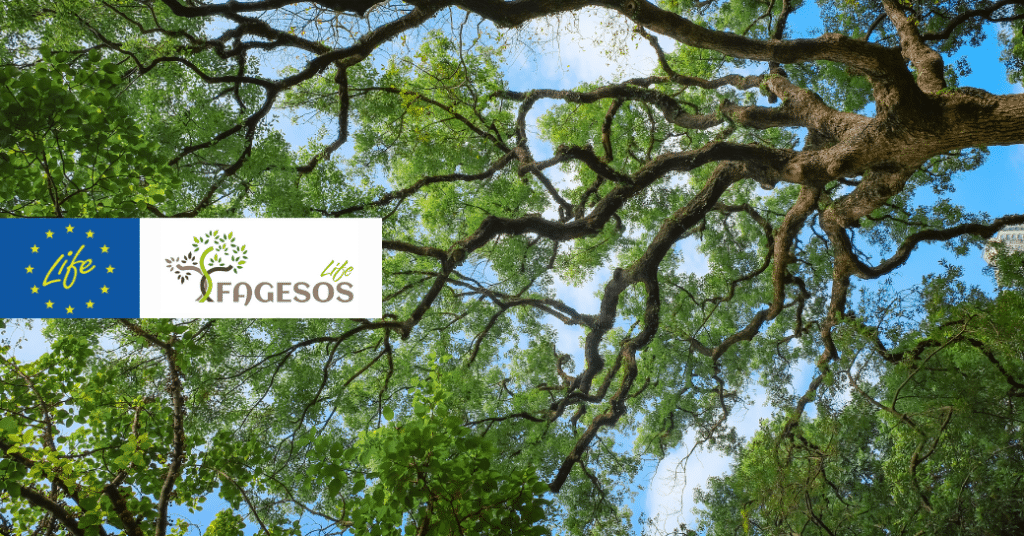Climate change increases the threat posed by invasive pathogens in natural and semi-natural forest ecosystems The impact and distribution of Phytophthora species are increasing in oak, cork oak, and chestnut ecosystems, which are predominant broadleaf species in Mediterranean forests. These ecosystems are currently experiencing serious issues of decline.

Objectives
The European project LIFE FAGESOS aims to propose solutions to this decline adapted to the ecosystems of these three species in order to:
- Prevent the spread of diseases through remote sensing-based monitoring, risk prediction, and the establishment of health measures to protect adjacent areas.
- Mitigate forest decline induced by Phytophthora through tailored combinations of bioproducts, such as resistance inducers, growth-promoting bacteria, biofumigant molecules, antagonistic microorganisms, and, whenever possible, new methods for administering potassium phosphonate.
Expected results
- 3 tailor-made integrated pest management protocols, one for each tree species
- New bio-stimulants validated for their effectiveness and properly combined with each other
- Treatment protocol for chestnut forests using potassium phosphonate distributed by drones.
- Mapping of risk areas and Phytophthora cinnamomi hotspots through the integration of multispectral remote sensing, stochastic models, and machine learning
- All of this with the active participation of professionals and the community in adopting health measures during field activities.
Expected Impacts
By implementing large-scale Integrated Pest Management protocols in Portugal, Spain, and Italy, LIFE FAGESOS aims to:
- Recover 40% of symptomatic trees, protect 100% of asymptomatic trees, and reduce Phytophthora inoculum in the soil of treated areas by 80%
- Reduce 18,119 hectares of vulnerable areas.
Evaluate and map the risk and impact of decline on 93,850 hectares of chestnut, oak, and cork oak in Portugal, Spain, and Italy - Restore the carbon sequestration capacity by 6,997,051 tons of CO2.
- ¡Prevent financial losses of €839,200 annually.”
- Through an extensive strategy for disseminating results and creating a multi-actor network connecting stakeholders even beyond the project’s timeline, it is expected that the positive impacts achieved during the project will multiply in the following years
Project Duration:
Start: September 1st, 2022
“End: August 31st, 2027.

LIFE FAGESOS is co-funded by the European LIFE Programme, under grant agreement 101074466 — LIFE21-CCA-IT-LIFE FAGESOS. However, the views and opinions expressed are solely those of the authors and do not necessarily reflect those of the European Union or CINEA. Neither the European Union nor CINEA (European Climate, Infrastructure and Environment Executive Agency) hold responsibility for them.
MEMBERS
ITALY
- Comune di Monte San Biagio, Lazio
- Ente Parco Naturale Regionale dei Monti Ausoni e Lago di Fondi, Lazio
- Regione Lazio
- Università degli Studi della Tuscia, Lazio
- Comune di Canepina, Lazio
- Comune di Vallerano, Lazio
- Società Agricola Monte Arcosu Srl, Sardegna
- Università degli Studi di Sassari, Sardegna
PORTUGAL
- Universidade de Tras-os-Montes e Alto Douro, Centro
SPAIN
- La Almoraima SA SME, Andalucia
- Universidad de Cordoba, Andalucia
- Centro De Investigaciones Aplicadas Al Desarrollo Agroforestal, Andalucia
- ATENS- Agrotecnologias Naturales SL, Cataluña
COORDINATOR
- Tiziana di Fazio
- tiziana.difazio@comune.montesanbiagio.lt.it
- tel. +39 0771.56.89.228



